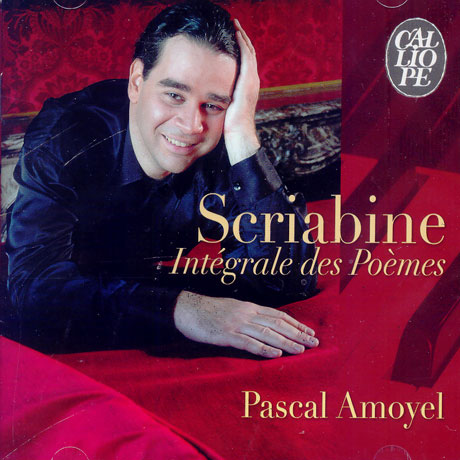Scriabine – Poèmes – Pascal Amoyel

|
|
|
|
Comme il me l’avait indiqué lors de son interview, après le grand succès qui accueillit son album consacré aux Nocturnes de Chopin, ne voulant surtout pas être catalogué comme un spécialiste de ce compositeur, il s’immergea dans cette série de poèmes de Scriabine, au point de ne plus jouer pendant une longue période (enregistrement de 2005) que ces œuvres de ce compositeur. Si j’ai cherché et réussi à le rencontrer, c’est que j’estime que c’est un musicien incomparable, humble, intègre, passionné, hyper-doué bien sûr. Il peut jouer n’importe quoi – ses variations sur Happy birthday to you par exemple, avec notamment un hilarant pastiche de Schoenberg – : on est totalement pris par son jeu. L’empathie qu’un mélomane, bien que critique, éprouve vis-à-vis d’un artiste, comme pour Kubelík, est chose bien mystérieuse. Mais mon tempérament critique reprend le dessus ; comme pour Chopin par Rubinstein, il m’avait cité parmi ses références pianistiques Sofronistky pour Scriabine : j’ai donc voulu comparer les deux dans ce que j’ai trouvé par le pianiste russe : les poèmes op. 32 N° 1; op. 59 n°1 et op. 69 n°1 (8/6/58). L’op. 32 N° 1 : la fluidité, la plénitude de certains accords, le jeu de pédale très travaillé, la sonorité : tout cela concoure à l’évidence chez Pascal, c’est vraiment beau à pleurer. Il le fait en 3’35, Sofronistky en 2’57. La concurrence est rude : Sofronistky était un peu pour Scriabine ce qu’était Cortot pour Chopin ! Époque et conditions d’enregistrement mises à part, il manque chez Amoyel cette sorte d’ambiance fataliste et ‘spirite’ que l’on a avec le pianiste russe ; cela ne ternit pourtant en rien son interprétation peut être moins évidente, mais tellement supérieurement musicale. Pour l’op. 59 n°1, la différence de tempo est encore plus criante : Amoyel : 2’10, Sofronisty : 1’33 ! C’est un peu Cortot / Pollini dans Chopin : chez le Russe, une évidence stylistique certaine, chez le Français un bonheur pianistique et musical… La divergence s’accroît avec l’op. 69 n°1 : 2’25 contre 1’33… Résumons : Sofronistky, c’est l’évidence stylistique, Amoyel, la jouissance musicale, sonore et intellectuelle ! Ajoutons la qualité de l’enregistrement – et du piano Steinway – ainsi qu’une interview de Pascal Amoyel aussi concernée qu’érudite… Op. 32 n°1
|
As he told me during my interview, after the great success encountered by his album devoted to the Nocturnes by Chopin, not wanting especially to be catalogued like a specialist of this composer, he immersedhimself in this series of poems by Scriabine, to the point of not playing for a long period (recording of 2005) anything but these If I sought and succeeded in interviewing him, this is because I think he is an incomparable musician, humble, passionate and hyper-gifted of course. He can play anything – his variations on ‘Happy birthday to you’ for example, with in particular a laughing pastiche of Schoenberg -: one is completely taken by his playing. The empathy that a music lover, although critical, has to an artist, as for Kubelík, is a quite mysterious thing. But my critical temperament takes again the top; as for Chopin by Rubinstein, he had quoted me among his pianistic references Sofronistky for Scriabine: I thus wanted to compare both in some pieces I found by the Russian pianist: poems op. 32 N° 1; op. 59 n°1 and op. 69 n°1 (6/8/58). The op. 32 N° 1: fluidity, the plenitude of certain chords, subtil play of pedal, sonority: it makes you cry of musical hapiness. He does it in 3 ‘ 35, Sofronistky in 2 ‘ 57. Competition is hard: Sofronistky was a little for Scriabine what was Cortot for Chopin! Time and conditions of recording put aside, Amoyel misses this kind of fatalistic and “spiritistic” environment that one has with the Russian pianist; that however does not tarnish his interpretation maybe less obvious, but so much superiorly musical. For the op. 59 n°1, the difference in tempo is even more evident: Amoyel: 2 ‘ 10, Sofronisty: 1’33 ! It is a little like Cortot/Pollini in Chopin: for the Russian, an obvious stylistic manner, for the French a pianistic and musical happiness … Op. 32 n°1
|
